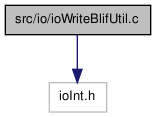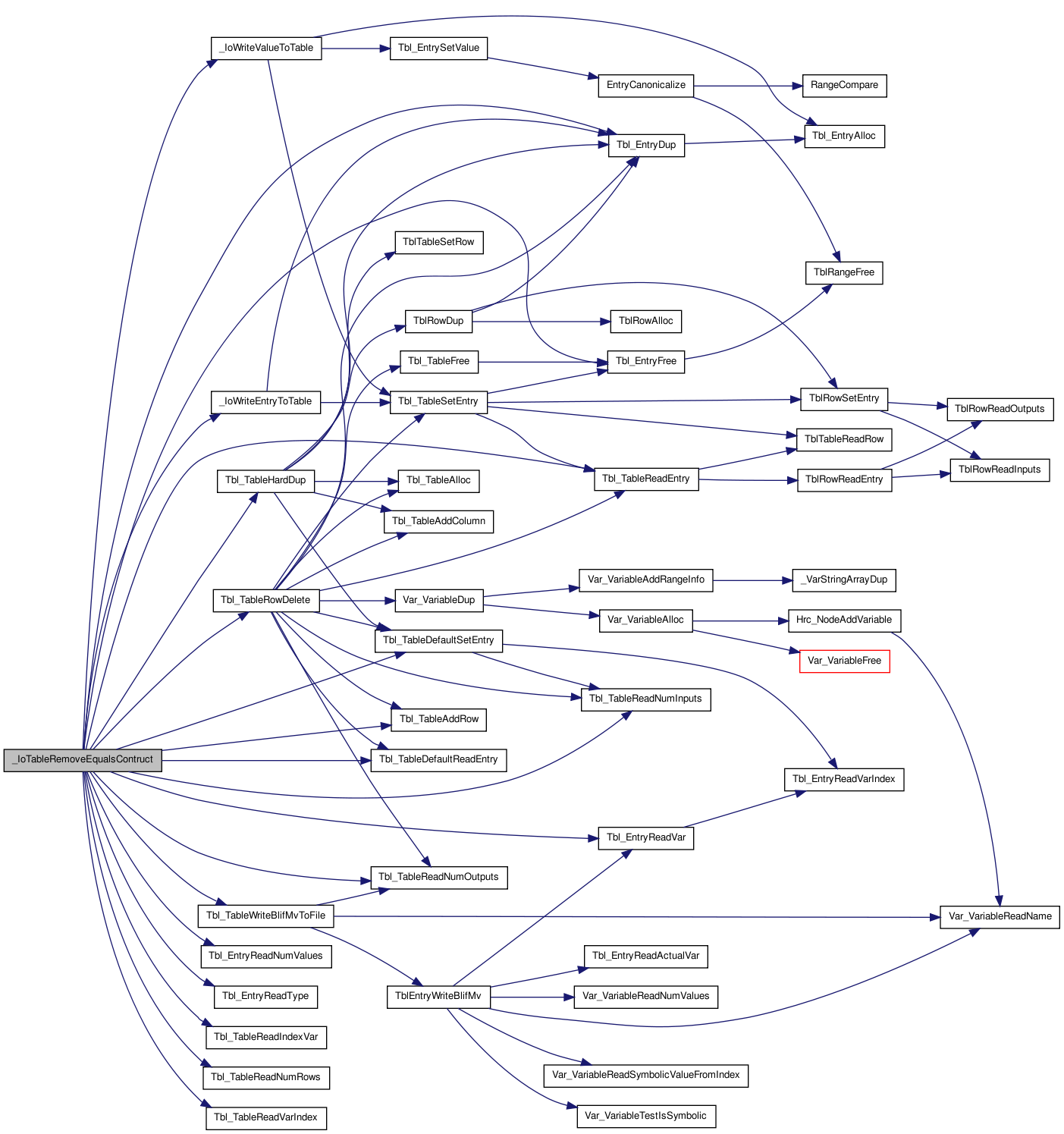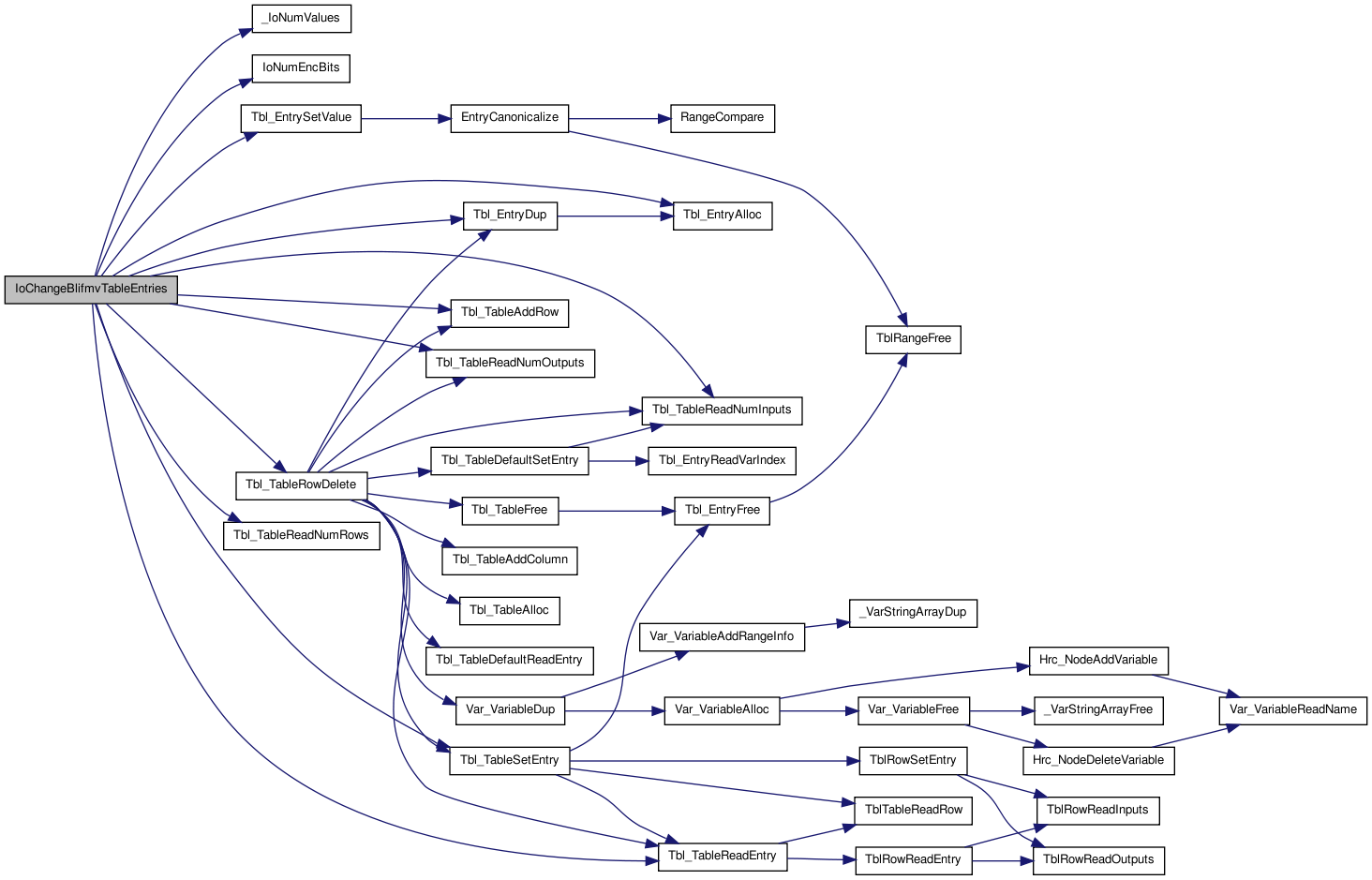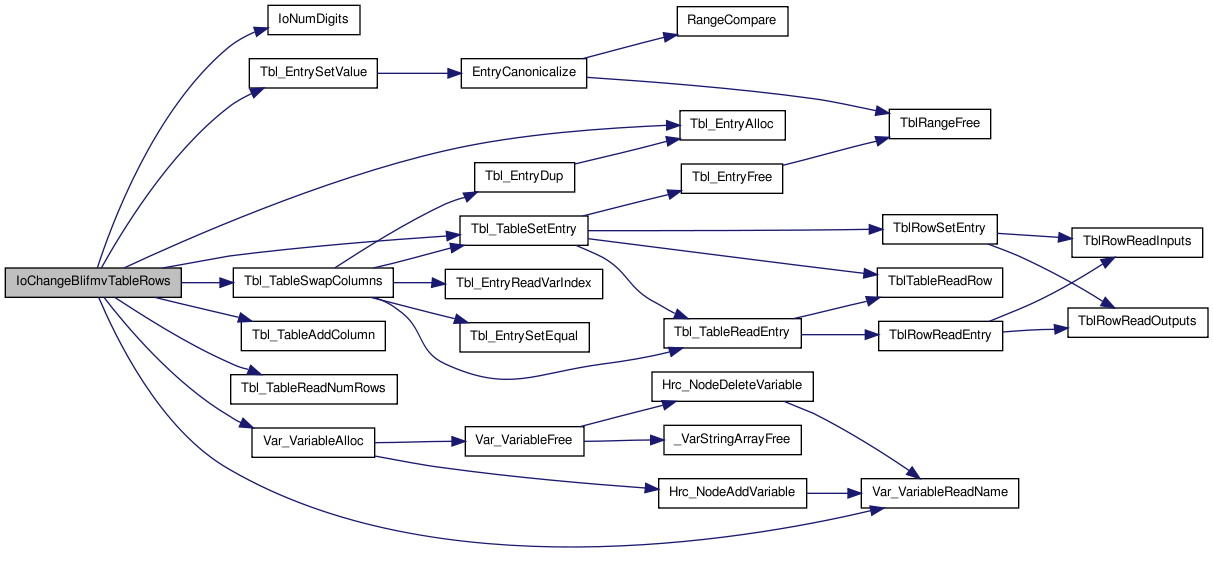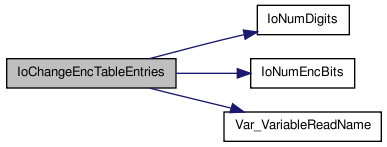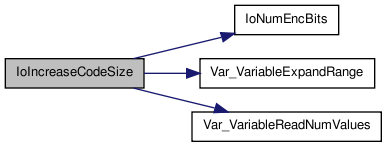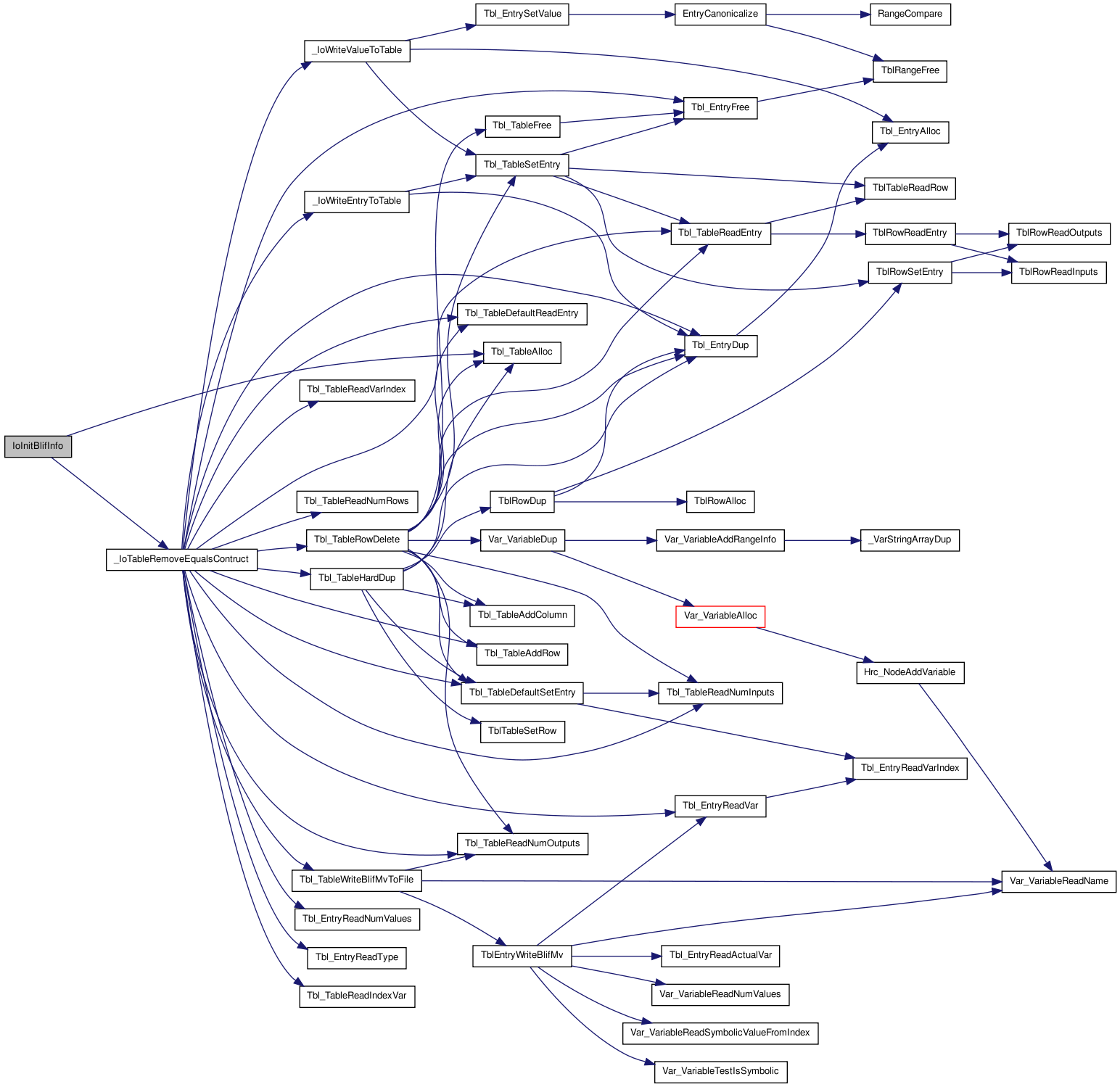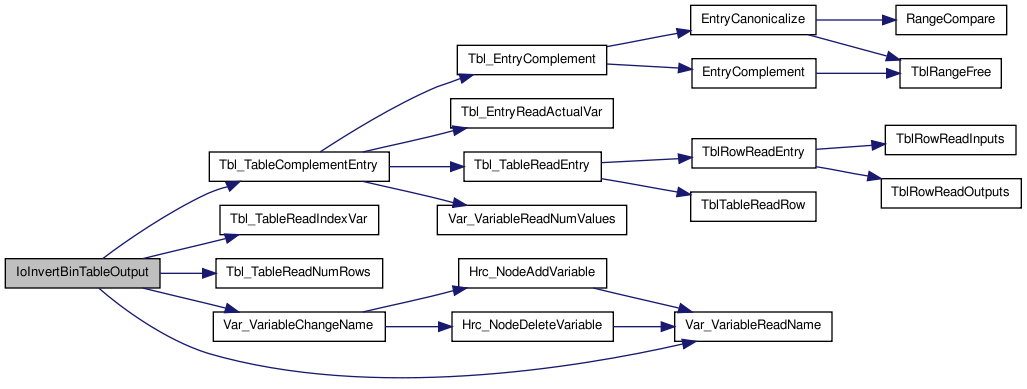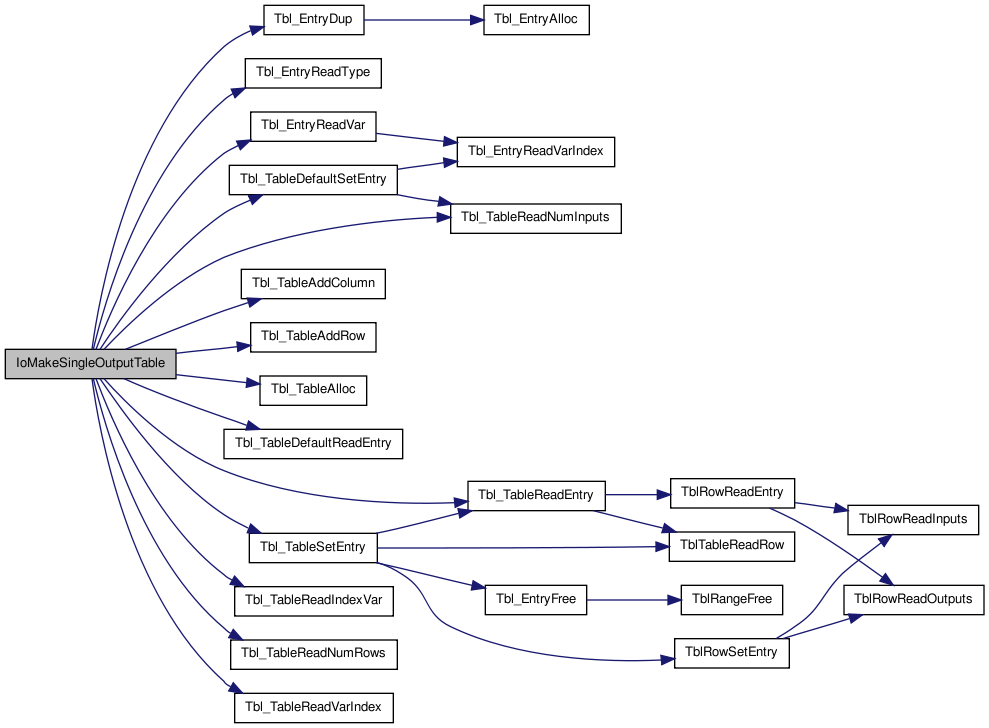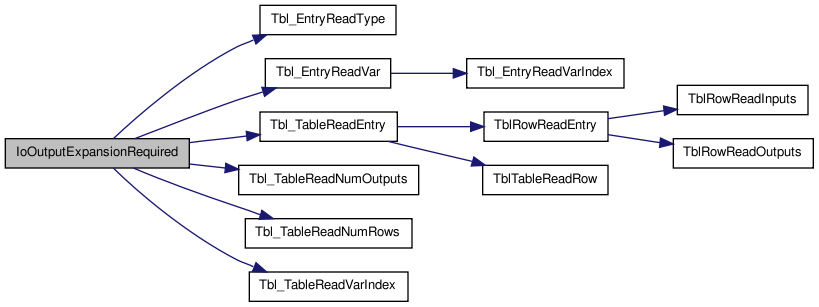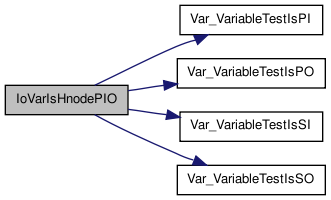#include "ioInt.h" Include dependency graph for ioWriteBlifUtil.c:
Include dependency graph for ioWriteBlifUtil.c:Go to the source code of this file.
Functions | |
| static void | _IoWriteEntryToTable (Tbl_Entry_t *entry, Tbl_Table_t *table, int row, int col, int output) |
| static void | _IoWriteValueToTable (int value, Tbl_Table_t *table, int row, int col, int output) |
| static Tbl_Table_t * | _IoTableRemoveEqualsContruct (Tbl_Table_t *origBlifmvTable, array_t *freeVarArray, int verbosity) |
| static void | _IoVarEncEntryFree (IoVarEncEntry_t *varEnc) |
| static int | _IoNumValues (int colnum, array_t *numValuesArray) |
| static Tbl_Entry_t * | _IoCreateBinRange (array_t *mvEntryBinRanges, Tbl_Entry_t *entry, int numBits, int runLength, int skipLength) |
| static boolean | _IoEntryCheckRange (Tbl_Entry_t *entry, int startValue, int runLength, int skipLength) |
| static Tbl_Entry_t * | _IoAddBinRange (array_t *mvEntryBinRanges, Tbl_Entry_t *entry, int startValue, int runLength, int skipLength) |
| Tbl_Table_t * | IoMakeSingleOutputTable (Tbl_Table_t *table, int outputNum) |
| boolean | IoOutputExpansionRequired (Tbl_Table_t *table) |
| void | IoInitBlifInfo (IoBlifInfo_t *blifInfo, Tbl_Table_t *origBlifmvTable, FILE *fp, FILE *encFp, int verbosity) |
| void | IoFreeBlifInfo (IoBlifInfo_t *blifInfo) |
| boolean | IoVarIsHnodePIO (Hrc_Node_t *hnode, Var_Variable_t *var) |
| void | IoEncodeVariable (IoBlifInfo_t *blifInfo, Var_Variable_t *var, int varNum, int output) |
| int | IoNumEncBits (int n) |
| int | IoNumDigits (int n) |
| int | IoLog (int n) |
| IoVarEncEntry_t * | IoFindSmallestCode (IoBlifInfo_t *blifInfo) |
| void | IoIncreaseCodeSize (IoVarEncEntry_t *varEnc, int numValues, int verbosity) |
| void | IoChangeBlifmvTableRows (IoBlifInfo_t *blifInfo, IoVarEncEntry_t *varEnc, int row1, int row2) |
| void | IoChangeBlifmvTableEntries (IoBlifInfo_t *blifInfo, int rownum, int numValues, IoVarEncEntry_t *varEnc, array_t *MvOutputArray) |
| void | IoChangeEncTableEntries (IoBlifInfo_t *blifInfo, st_table *blifInputsStTable, IoVarEncEntry_t *varEnc, int numValues) |
| void | IoInvertBinTableOutput (IoBlifInfo_t *blifInfo, int colnumToInvert) |
| array_t * | IoMakeBinaryRangesArray (Tbl_Entry_t *entry, int colnum, IoBlifInfo_t *blifInfo) |
| int | IoNumValuesFromBinRangesArray (int colnum, array_t *binRangesArray) |
| int | IoNumBinVars (int colnum, array_t *encTblArray) |
Variables | |
| static char rcsid[] | UNUSED = "$Id: ioWriteBlifUtil.c,v 1.12 2005/05/14 02:15:22 fabio Exp $" |
Function Documentation
| static Tbl_Entry_t * _IoAddBinRange | ( | array_t * | mvEntryBinRanges, |
| Tbl_Entry_t * | entry, | ||
| int | startValue, | ||
| int | runLength, | ||
| int | skipLength | ||
| ) | [static] |
Function********************************************************************
Synopsis [Enters a (startValue, runLength, skipLength) tuple into the mvEntryBinRanges array]
Description [adds a IoBinRangeEntry_t * to the mvEntryBinRanges. ]
SideEffects []
SeeAlso []
Definition at line 1280 of file ioWriteBlifUtil.c.
{
IoBinRangeEntry_t *binRangeEntry;
int i, value;
Tbl_Entry_t *newEntry;
lsGen gen;
Tbl_Range_t *range;
binRangeEntry = ALLOC(IoBinRangeEntry_t, 1);
binRangeEntry->startValue = startValue;
binRangeEntry->runLength = runLength;
binRangeEntry->skipLength = skipLength;
array_insert_last(IoBinRangeEntry_t *, mvEntryBinRanges, binRangeEntry);
newEntry = Tbl_EntryAlloc(Tbl_EntryNormal_c);
i = 0;
Tbl_EntryForEachValue(entry, value, gen, range){
if((value == startValue + (i * skipLength)) && (i < runLength)){
i++;
}
else{
Tbl_EntrySetValue(newEntry, value, value);
}
}
Tbl_EntryFree(entry);
return newEntry;
}
 Here is the call graph for this function:
Here is the call graph for this function: Here is the caller graph for this function:
Here is the caller graph for this function:| static Tbl_Entry_t * _IoCreateBinRange | ( | array_t * | mvEntryBinRanges, |
| Tbl_Entry_t * | entry, | ||
| int | numBits, | ||
| int | runLength, | ||
| int | skipLength | ||
| ) | [static] |
Function********************************************************************
Synopsis [Returns a (startValue, runLength) pair such that the runLength is the largest number of contiguous values in entry, starting from startValue]
Description [adds a IoBinRangeEntry_t * to the mvEntryBinRanges. Also returns the value upto which all values of the entry have been entered in the mvEntryBinRanges.]
SideEffects []
SeeAlso []
Definition at line 1226 of file ioWriteBlifUtil.c.
{
int i, j, bitPos, tempI, numDash, end, numStartValues, startValue;
array_t *freeBitsArray;
numDash = IoLog(runLength);
end = IoLog(skipLength);
freeBitsArray = array_alloc(int, 0);
for(i = 0; i < numBits; i++){
if(i < end){
array_insert_last(int, freeBitsArray, i);
}
if(i >= end + numDash){
array_insert_last(int, freeBitsArray, i);
}
}
numStartValues = (int) pow((double) 2, (double) array_n(freeBitsArray));
for(i = 0; i < numStartValues; i++){
startValue = 0;
tempI = i;
for(j = array_n(freeBitsArray) - 1; j >= 0; j--){
if(tempI >= (int) pow((double) 2, (double) j)){
bitPos = array_fetch(int, freeBitsArray, j);
startValue += (int) pow((double) 2, (double) bitPos);
tempI -= (int) pow((double) 2, (double) j);
}
}
/* fprintf(stdout, "trying start %d, run %d, skip %d\n", startValue, runLength, skipLength); */
if(_IoEntryCheckRange(entry, startValue, runLength, skipLength)){
entry = _IoAddBinRange(mvEntryBinRanges, entry, startValue, runLength, skipLength);
}
}
array_free(freeBitsArray);
return entry;
}
 Here is the call graph for this function:
Here is the call graph for this function: Here is the caller graph for this function:
Here is the caller graph for this function:| static boolean _IoEntryCheckRange | ( | Tbl_Entry_t * | entry, |
| int | startValue, | ||
| int | runLength, | ||
| int | skipLength | ||
| ) | [static] |
Function********************************************************************
Synopsis [Checks if runLength entries from startValue with skipLength increments are contained in entry ]
Description []
SideEffects []
SeeAlso []
Definition at line 1172 of file ioWriteBlifUtil.c.
{
boolean startFound;
int value, i;
lsGen gen;
Tbl_Range_t *range;
startFound = FALSE;
i = 1;
Tbl_EntryForEachValue(entry, value, gen, range){
if(value == startValue){
startFound = TRUE;
}
if((!startFound) && (value > startValue)){
lsFinish(gen);
return FALSE;
}
if(value == startValue + (i * skipLength)){
i++;
}
if(value > startValue + (i * skipLength)){
lsFinish(gen);
return FALSE;
}
if(i == runLength){
lsFinish(gen);
return TRUE;
}
}
return FALSE;
}
 Here is the caller graph for this function:
Here is the caller graph for this function:| static int _IoNumValues | ( | int | colnum, |
| array_t * | numValuesArray | ||
| ) | [static] |
Function********************************************************************
Synopsis [Returns the number of values in the entrycolnum-1) ]
Description []
SideEffects []
SeeAlso []
Definition at line 1326 of file ioWriteBlifUtil.c.
{
if(colnum == 0){
return 1;
}
else{
return(array_fetch(int, numValuesArray, colnum - 1));
}
}
 Here is the caller graph for this function:
Here is the caller graph for this function:| static Tbl_Table_t * _IoTableRemoveEqualsContruct | ( | Tbl_Table_t * | origBlifmvTable, |
| array_t * | freeVarArray, | ||
| int | verbosity | ||
| ) | [static] |
Function********************************************************************
Synopsis [Removes "=" constructs in a table]
Description []
SideEffects []
SeeAlso []
Definition at line 917 of file ioWriteBlifUtil.c.
{
Tbl_Table_t *resultTable;
int numRows, numInputs, numOutputs, numRowsAfterExpansion, i, j, k, colnum, rownum, currRow, value;
int parentVarnumValues, parentVarIndex, rootRow, entryRepetitionCount ;
st_table *parentsStTable;
Tbl_Entry_t *entry, *parentVarEntry, *dupEntry;
Var_Variable_t *parentVar, *var;
boolean parentVarIsOutput, rowContainsEqualEntries, insertedI;
st_generator *gen;
Tbl_Range_t *range;
lsGen listgen;
array_t *rowDeleteArray;
char *dummy;
resultTable = Tbl_TableHardDup(origBlifmvTable);
/* remove "="s in original defaults table*/
for(i = 0; i < Tbl_TableReadNumOutputs(resultTable); i++){
entry = Tbl_TableDefaultReadEntry(resultTable, i);
if(entry != NIL(Tbl_Entry_t)){
if(Tbl_EntryReadType(entry) != Tbl_EntryNormal_c){
var = Tbl_EntryReadVar(resultTable, entry);
j = Tbl_TableReadVarIndex(resultTable, var, 1);
parentVarEntry = Tbl_TableDefaultReadEntry(resultTable, j);
dupEntry = Tbl_EntryDup(parentVarEntry);
Tbl_TableDefaultSetEntry(resultTable, dupEntry, i);
Tbl_EntryFree(entry);
}
}
}
/* first expand all rows with "=" constructs, in the same table */
numRows = Tbl_TableReadNumRows(resultTable);
numInputs = Tbl_TableReadNumInputs(resultTable);
numOutputs = Tbl_TableReadNumOutputs(resultTable);
rootRow = numRows;
for(i = 0; i < numRows; i++){
numRowsAfterExpansion = 1;
rowContainsEqualEntries = FALSE;
parentsStTable = st_init_table(st_ptrcmp, st_ptrhash);
/* find variables that are parent variables, ie variables 'var' that
have =var references in that row of the table */
for(colnum = 0; colnum < numInputs; colnum++){
entry = Tbl_TableReadEntry(resultTable, i, colnum, 0);
if(Tbl_EntryReadType(entry) == Tbl_EntryEqual_c){
rowContainsEqualEntries = TRUE;
parentVar = Tbl_EntryReadVar(resultTable, entry);
st_insert(parentsStTable, (char *) parentVar, (char *) 1);
}
}
for(colnum = 0; colnum < numOutputs; colnum++){
entry = Tbl_TableReadEntry(resultTable, i, colnum, 1);
if(Tbl_EntryReadType(entry) == Tbl_EntryEqual_c){
rowContainsEqualEntries = TRUE;
parentVar = Tbl_EntryReadVar(resultTable, entry);
st_insert(parentsStTable, (char *) parentVar, (char *) 1);
}
}
if(rowContainsEqualEntries == FALSE){
st_free_table(parentsStTable);
continue;
}
/* find the number of rows after expansion */
st_foreach_item(parentsStTable, gen, &parentVar, &dummy){
parentVarIndex = Tbl_TableReadVarIndex(resultTable, parentVar, 0);
if(parentVarIndex != -1){
parentVarIsOutput = 0;
}
else{
parentVarIsOutput = 1;
parentVarIndex = Tbl_TableReadVarIndex(resultTable, parentVar, 1);
}
parentVarEntry = Tbl_TableReadEntry(resultTable, i, parentVarIndex, parentVarIsOutput);
numRowsAfterExpansion *= Tbl_EntryReadNumValues(parentVarEntry);
}
/* write out expanded form of this row */
for(j = 0; j < numRowsAfterExpansion; j++){
Tbl_TableAddRow(resultTable);
}
/* expand parent variables first */
entryRepetitionCount = numRowsAfterExpansion;
st_foreach_item(parentsStTable, gen, &parentVar, &dummy){
parentVarIndex = Tbl_TableReadVarIndex(resultTable, parentVar, 0);
if(parentVarIndex != -1){
parentVarIsOutput = 0;
}
else{
parentVarIsOutput = 1;
parentVarIndex = Tbl_TableReadVarIndex(resultTable, parentVar, 1);
}
parentVarEntry = Tbl_TableReadEntry(resultTable, i, parentVarIndex,
parentVarIsOutput);
parentVarnumValues = Tbl_EntryReadNumValues(parentVarEntry);
currRow = rootRow;
entryRepetitionCount = entryRepetitionCount / parentVarnumValues;
while(currRow < rootRow + numRowsAfterExpansion){
Tbl_EntryForEachValue(parentVarEntry, value, listgen, range){
for(k = 0; k < entryRepetitionCount; k++){
_IoWriteValueToTable(value, resultTable, currRow, parentVarIndex,
parentVarIsOutput);
currRow++;
}
}
}
}
/* next expand variables that reference parent vars */
for(colnum = 0; colnum < numInputs; colnum++){
entry = Tbl_TableReadEntry(resultTable, i, colnum, 0);
if(Tbl_EntryReadType(entry) == Tbl_EntryEqual_c){
parentVar = Tbl_EntryReadVar(resultTable, entry);
parentVarIndex = Tbl_TableReadVarIndex(resultTable, parentVar, 0);
if(parentVarIndex != -1){
parentVarIsOutput = 0;
}
else{
parentVarIsOutput = 1;
parentVarIndex = Tbl_TableReadVarIndex(resultTable, parentVar, 1);
}
parentVarEntry = Tbl_TableReadEntry(resultTable, i, parentVarIndex,
parentVarIsOutput);
for(k = rootRow; k < rootRow + numRowsAfterExpansion; k++){
entry = Tbl_TableReadEntry(resultTable, k, parentVarIndex,
parentVarIsOutput);
_IoWriteEntryToTable(entry, resultTable, k, colnum, 0);
}
}
else{
if(!st_is_member(parentsStTable, (char *) Tbl_TableReadIndexVar(resultTable,
colnum, 0))){
for(k = rootRow; k < rootRow + numRowsAfterExpansion; k++){
_IoWriteEntryToTable(entry, resultTable, k, colnum, 0);
}
}
}
}
for(colnum = 0; colnum < numOutputs; colnum++){
entry = Tbl_TableReadEntry(resultTable, i, colnum, 1);
if(Tbl_EntryReadType(entry) == Tbl_EntryEqual_c){
parentVar = Tbl_EntryReadVar(resultTable, entry);
parentVarIndex = Tbl_TableReadVarIndex(resultTable, parentVar, 0);
if(parentVarIndex != -1){
parentVarIsOutput = 0;
}
else{
parentVarIsOutput = 1;
parentVarIndex = Tbl_TableReadVarIndex(resultTable, parentVar, 1);
}
parentVarEntry = Tbl_TableReadEntry(resultTable, i, parentVarIndex,
parentVarIsOutput);
for(k = rootRow; k < rootRow + numRowsAfterExpansion; k++){
entry = Tbl_TableReadEntry(resultTable, k, parentVarIndex,
parentVarIsOutput);
_IoWriteEntryToTable(entry, resultTable, k, colnum, 1);
}
}
else{
if(!st_is_member(parentsStTable, (char *) Tbl_TableReadIndexVar(resultTable,
colnum, 1))){
for(k = rootRow; k < rootRow + numRowsAfterExpansion; k++){
_IoWriteEntryToTable(entry, resultTable, k, colnum, 1);
}
}
}
}
rootRow += numRowsAfterExpansion;
st_free_table(parentsStTable);
}
/* now delete rows with "=" constructs */
rowDeleteArray = array_alloc(int, 0);
for(i = 0; i < numRows; i++){
insertedI = FALSE;
for(colnum = 0; colnum < numInputs; colnum++){
entry = Tbl_TableReadEntry(resultTable, i, colnum, 0);
if(Tbl_EntryReadType(entry) == Tbl_EntryEqual_c){
if(!insertedI){
array_insert_last(int, rowDeleteArray, i);
insertedI = TRUE;
}
}
}
for(colnum = 0; colnum < numOutputs; colnum++){
entry = Tbl_TableReadEntry(resultTable, i, colnum, 1);
if(Tbl_EntryReadType(entry) == Tbl_EntryEqual_c){
if(!insertedI){
array_insert_last(int, rowDeleteArray, i);
insertedI = TRUE;
}
}
}
}
/* array of vars that are to be freed. Since these are called with
a NIL(Hrc_Node_t), they need to be freed separately, and kept track
of
*/
for(i = 0; i < array_n(rowDeleteArray); i++){
rownum = array_fetch(int, rowDeleteArray, i) - i;
resultTable = Tbl_TableRowDelete(resultTable, rownum, freeVarArray);
}
array_free(rowDeleteArray);
if(verbosity > 1){
(void)fprintf(stdout, "Blifmv Table after = removal is\n");
Tbl_TableWriteBlifMvToFile(resultTable, 0, stdout);
}
return resultTable;
}
 Here is the call graph for this function:
Here is the call graph for this function: Here is the caller graph for this function:
Here is the caller graph for this function:| static void _IoVarEncEntryFree | ( | IoVarEncEntry_t * | varEnc | ) | [static] |
Function********************************************************************
Synopsis [Frees the IoVarEncEntry_t ]
Description []
SideEffects []
SeeAlso []
Definition at line 1150 of file ioWriteBlifUtil.c.
{
Var_VariableFree(varEnc->variable);
free(varEnc);
}
 Here is the call graph for this function:
Here is the call graph for this function: Here is the caller graph for this function:
Here is the caller graph for this function:| static void _IoWriteEntryToTable | ( | Tbl_Entry_t * | entry, |
| Tbl_Table_t * | table, | ||
| int | row, | ||
| int | col, | ||
| int | output | ||
| ) | [static] |
AutomaticStart
Function********************************************************************
Synopsis [Duplicate an entry and set it in a table]
Description []
SideEffects []
SeeAlso []
Definition at line 863 of file ioWriteBlifUtil.c.
{
Tbl_Entry_t *dupEntry;
dupEntry = Tbl_EntryDup(entry);
Tbl_TableSetEntry(table, dupEntry, row, col, output);
}
 Here is the call graph for this function:
Here is the call graph for this function: Here is the caller graph for this function:
Here is the caller graph for this function:| static void _IoWriteValueToTable | ( | int | value, |
| Tbl_Table_t * | table, | ||
| int | row, | ||
| int | col, | ||
| int | output | ||
| ) | [static] |
Function********************************************************************
Synopsis [Make an entry from a value, and set it in a table]
Description []
SideEffects []
SeeAlso []
Definition at line 890 of file ioWriteBlifUtil.c.
{
Tbl_Entry_t *entry;
entry = Tbl_EntryAlloc(Tbl_EntryNormal_c);
Tbl_EntrySetValue(entry, value, value);
Tbl_TableSetEntry(table, entry, row, col, output);
}
 Here is the call graph for this function:
Here is the call graph for this function: Here is the caller graph for this function:
Here is the caller graph for this function:| void IoChangeBlifmvTableEntries | ( | IoBlifInfo_t * | blifInfo, |
| int | rownum, | ||
| int | numValues, | ||
| IoVarEncEntry_t * | varEnc, | ||
| array_t * | MvOutputArray | ||
| ) |
Function********************************************************************
Synopsis [Alters table to reflect the increase in code size from IoIncreaseCodeSize]
Description []
SideEffects []
SeeAlso []
Definition at line 574 of file ioWriteBlifUtil.c.
{
int i, j, k, newrownum, colnum, inputColnumToChange, value, offset;
int numInputs, numOutputs, entryRepetitionCount, numCycles, numNewBits, maxValue, numOldBits;
Tbl_Entry_t *entry, *dupEntry;
lsGen gen;
Tbl_Range_t *range;
numInputs = Tbl_TableReadNumInputs(blifInfo->blifmvTable);
numOutputs = Tbl_TableReadNumOutputs(blifInfo->blifmvTable);
numNewBits = IoNumEncBits(numValues);
numOldBits = varEnc->numEncBits;
maxValue = (int) pow((double) 2, (double)(numNewBits + numOldBits));
inputColnumToChange = varEnc->index;
for(i = 0; i < Tbl_TableReadNumRows(blifInfo->blifmvTable); i++){
if (i != rownum){
entry = Tbl_TableReadEntry(blifInfo->blifmvTable, i, inputColnumToChange, 0);
dupEntry = Tbl_EntryDup(entry);
offset = (int) pow((double) 2, (double)varEnc->numEncBits);
Tbl_EntryForEachValue(entry, value, gen, range){
for(j = value ; j < maxValue; j = j + offset){
Tbl_EntrySetValue(dupEntry, j, j);
}
}
Tbl_TableSetEntry(blifInfo->blifmvTable, dupEntry, i, inputColnumToChange, 0);
}
}
newrownum = -1;
for(i = 0; i < numValues; i++){
/* add a row, and duplicate all entries of the original row except for
the one that needs a new entry (because of the new code). This entry
gets code = oldCode + i * (2^numCurrentEncBits) */
newrownum = Tbl_TableAddRow(blifInfo->blifmvTable);
assert(newrownum != -1);
for(colnum = 0; colnum < numInputs; colnum++){
entry = Tbl_TableReadEntry(blifInfo->blifmvTable, rownum, colnum, 0);
if(colnum != inputColnumToChange){
dupEntry = Tbl_EntryDup(entry);
Tbl_TableSetEntry(blifInfo->blifmvTable, dupEntry, newrownum, colnum, 0);
}
else{
dupEntry = Tbl_EntryAlloc(Tbl_EntryNormal_c);
offset = i * ((int) pow((double) 2, (double) varEnc->numEncBits));
Tbl_EntryForEachValue(entry, value, gen, range){
Tbl_EntrySetValue(dupEntry, value + offset, value + offset);
}
Tbl_TableSetEntry(blifInfo->blifmvTable, dupEntry, newrownum, colnum, 0);
}
}
}
/* This section singleton-izes the output entries of the new row.
Multiple outputs are accounted for. If more than one output has
non-singleton entries, they are all singleton-ized. Finally,
the original row is deleted... */
entryRepetitionCount = numValues;
numCycles = 1;
newrownum++;
for(colnum = 0; colnum < numOutputs; colnum++){
newrownum = newrownum - numValues;
numCycles *= _IoNumValues(colnum, MvOutputArray);
entryRepetitionCount /= array_fetch(int, MvOutputArray, colnum);
entry = Tbl_TableReadEntry(blifInfo->blifmvTable, rownum, colnum, 1);
for(j = 0; j < numCycles; j++){
Tbl_EntryForEachValue(entry, value, gen, range){
for(k = 0; k < entryRepetitionCount; k++){
dupEntry = Tbl_EntryAlloc(Tbl_EntryNormal_c);
Tbl_EntrySetValue(dupEntry, value, value);
Tbl_TableSetEntry(blifInfo->blifmvTable, dupEntry, newrownum++, colnum, 1);
}
}
}
}
blifInfo->blifmvTable = Tbl_TableRowDelete(blifInfo->blifmvTable, rownum, blifInfo->varArray);
}
 Here is the call graph for this function:
Here is the call graph for this function: Here is the caller graph for this function:
Here is the caller graph for this function:| void IoChangeBlifmvTableRows | ( | IoBlifInfo_t * | blifInfo, |
| IoVarEncEntry_t * | varEnc, | ||
| int | row1, | ||
| int | row2 | ||
| ) |
Function********************************************************************
Synopsis [Alters blifmv table to reflect the increase in code size from IoIncreaseCodeSize]
Description []
SideEffects []
SeeAlso []
Definition at line 508 of file ioWriteBlifUtil.c.
{
int numCurrentBits, i, numRows, colnum, tempCol, reqdColnum;
Tbl_Entry_t *entry;
char *varname, *dupName;
Var_Variable_t *newVar;
IoVarEncEntry_t *tempVarEnc;
/* add a new column to bin table */
numCurrentBits = varEnc->numEncBits;
varname = Var_VariableReadName(varEnc->variable);
dupName = ALLOC(char, strlen(varname) + IoNumDigits(numCurrentBits) + 2);
sprintf(dupName, "%s%d", varname, numCurrentBits);
newVar = Var_VariableAlloc(NIL(Hrc_Node_t), dupName);
FREE(dupName);
array_insert_last(Var_Variable_t *, blifInfo->varArray, newVar);
colnum = Tbl_TableAddColumn(blifInfo->binTable, newVar, 0);
numRows = Tbl_TableReadNumRows(blifInfo->binTable);
for(i = 0; i < numRows; i++){
entry = Tbl_EntryAlloc(Tbl_EntryNormal_c);
if(i == row1){
Tbl_EntrySetValue(entry, 0, 0);
}
if(i == row2){
Tbl_EntrySetValue(entry, 1, 1);
}
if((i != row1) && (i != row2)){
Tbl_EntrySetValue(entry, 0, 1);
}
Tbl_TableSetEntry(blifInfo->binTable, entry, i, colnum - 1, 0);
}
tempCol = 0;
reqdColnum = -1;
for(i = 0; i < array_n(blifInfo->inputEncTblArray); i++){
tempVarEnc = array_fetch(IoVarEncEntry_t *, blifInfo->inputEncTblArray, i);
if(tempVarEnc == varEnc){
reqdColnum = tempCol + varEnc->numEncBits;
}
tempCol += tempVarEnc->numEncBits;
}
colnum--;
assert(reqdColnum != -1);
while(reqdColnum < colnum){
Tbl_TableSwapColumns(blifInfo->binTable, colnum, colnum - 1, 0);
colnum--;
}
}
 Here is the call graph for this function:
Here is the call graph for this function: Here is the caller graph for this function:
Here is the caller graph for this function:| void IoChangeEncTableEntries | ( | IoBlifInfo_t * | blifInfo, |
| st_table * | blifInputsStTable, | ||
| IoVarEncEntry_t * | varEnc, | ||
| int | numValues | ||
| ) |
Function********************************************************************
Synopsis [Alters table to reflect the increase in code size from IoIncreaseCodeSize]
Description []
SideEffects []
SeeAlso []
Definition at line 674 of file ioWriteBlifUtil.c.
{
int numOrigBits, numAddedBits, i;
char *varname, *dupName;
numAddedBits = IoNumEncBits(numValues);
numOrigBits = varEnc->numEncBits;
varname = Var_VariableReadName(varEnc->variable);
for(i=0; i<numAddedBits; i++){
dupName = ALLOC(char, strlen(varname) + IoNumDigits(numAddedBits + numOrigBits)+ 2);
sprintf(dupName, "%s%d", varname, i + numOrigBits);
if(!st_is_member(blifInputsStTable, (char *)dupName)){
(void)fprintf(blifInfo->BlifFp, ".inputs %s\n", dupName);
if(blifInfo->pseudoinputFlag == FALSE){
(void)fprintf(blifInfo->EncFp, ".table %s\n", dupName);
(void)fprintf(blifInfo->EncFp, "-\n");
}
st_insert(blifInputsStTable, (char *)dupName, (char *)1);
}
else{
FREE(dupName);
}
}
varEnc->numEncBits += numAddedBits;
}
 Here is the call graph for this function:
Here is the call graph for this function: Here is the caller graph for this function:
Here is the caller graph for this function:| void IoEncodeVariable | ( | IoBlifInfo_t * | blifInfo, |
| Var_Variable_t * | var, | ||
| int | varNum, | ||
| int | output | ||
| ) |
Function********************************************************************
Synopsis [Encodes individual variable based on its ranges]
Description [Returns encoding as an entry in the array of encodings' tables]
SideEffects [Populates a table in the array of tables describing the IO encodings]
SeeAlso []
Definition at line 316 of file ioWriteBlifUtil.c.
{
int range, numEncBits;
IoVarEncEntry_t *varEncEntry;
range = Var_VariableReadNumValues(var);
numEncBits = IoNumEncBits(range);
varEncEntry = ALLOC(IoVarEncEntry_t, 1);
varEncEntry->variable = Var_VariableDup(var, NIL(Hrc_Node_t));
varEncEntry->index = varNum;
varEncEntry->numEncBits = numEncBits;
if(output == 1){
array_insert_last(IoVarEncEntry_t *, blifInfo->outputEncTblArray, varEncEntry);
}
else{
array_insert_last(IoVarEncEntry_t *, blifInfo->inputEncTblArray, varEncEntry);
}
}
 Here is the call graph for this function:
Here is the call graph for this function: Here is the caller graph for this function:
Here is the caller graph for this function:| IoVarEncEntry_t* IoFindSmallestCode | ( | IoBlifInfo_t * | blifInfo | ) |
Function********************************************************************
Synopsis [Returns the IoVarEncEntry_t with the smallest encoding length]
Description []
SideEffects []
SeeAlso []
Definition at line 436 of file ioWriteBlifUtil.c.
{
int i, smallestCode, index;
IoVarEncEntry_t *varEnc;
index = -1;
smallestCode = VIS_INFINITY;
for(i = 0; i < array_n(blifInfo->inputEncTblArray); i++){
varEnc = array_fetch(IoVarEncEntry_t *, blifInfo->inputEncTblArray, i);
if((Var_VariableReadNumValues(varEnc->variable)) < smallestCode){
smallestCode = Var_VariableReadNumValues(varEnc->variable);
index = i;
}
}
assert(index != -1);
varEnc = array_fetch(IoVarEncEntry_t *, blifInfo->inputEncTblArray, index);
return varEnc;
}
 Here is the call graph for this function:
Here is the call graph for this function: Here is the caller graph for this function:
Here is the caller graph for this function:| void IoFreeBlifInfo | ( | IoBlifInfo_t * | blifInfo | ) |
Function********************************************************************
Synopsis [Frees IoBlifInfo_t data structure]
Description [ ]
SideEffects []
SeeAlso []
Definition at line 239 of file ioWriteBlifUtil.c.
{
int i;
Tbl_TableFree(blifInfo->blifmvTable);
Tbl_TableFree(blifInfo->binTable);
for(i=0; i < array_n(blifInfo->inputEncTblArray); i++){
_IoVarEncEntryFree(array_fetch(IoVarEncEntry_t *, blifInfo->inputEncTblArray, i));
}
array_free(blifInfo->inputEncTblArray);
for(i=0; i < array_n(blifInfo->outputEncTblArray); i++){
_IoVarEncEntryFree(array_fetch(IoVarEncEntry_t *, blifInfo->outputEncTblArray, i));
}
array_free(blifInfo->outputEncTblArray);
for(i=0; i < array_n(blifInfo->varArray); i++){
Var_VariableFree(array_fetch(Var_Variable_t *, blifInfo->varArray, i));
}
array_free(blifInfo->varArray);
for(i=0; i < array_n(blifInfo->binTblArray); i++){
Tbl_TableFree(array_fetch(Tbl_Table_t *, blifInfo->binTblArray, i));
}
array_free(blifInfo->binTblArray);
for(i=0; i < array_n(blifInfo->dcTblArray); i++){
Tbl_TableFree(array_fetch(Tbl_Table_t *, blifInfo->dcTblArray, i));
}
array_free(blifInfo->dcTblArray);
FREE(blifInfo);
}
 Here is the call graph for this function:
Here is the call graph for this function: Here is the caller graph for this function:
Here is the caller graph for this function:| void IoIncreaseCodeSize | ( | IoVarEncEntry_t * | varEnc, |
| int | numValues, | ||
| int | verbosity | ||
| ) |
Function********************************************************************
Synopsis [Increases the code size of a variable]
Description [Invoked when a output for a row has multiple values. To determinize this scenario, an input has pseudovariables appended to its code. The number of pseudoinputs = log(n) where n is the number of values of the output]
SideEffects [alters encoding of mv variables]
SeeAlso []
Definition at line 474 of file ioWriteBlifUtil.c.
{
int temp1, temp2, range, numAddedPseudovars, numExpand;
range = Var_VariableReadNumValues(varEnc->variable);
numAddedPseudovars = IoNumEncBits(numValues);
temp1 = ((int) pow((double) 2, (double)numAddedPseudovars)) - 1;
temp2 = (int) pow((double) 2, (double)varEnc->numEncBits);
numExpand = (temp1 * temp2) + range;
if(verbosity > 2){
(void)fprintf(stdout, "New Number of Values for the variable = %d\n", numExpand);
}
Var_VariableExpandRange(varEnc->variable, numExpand);
}
 Here is the call graph for this function:
Here is the call graph for this function: Here is the caller graph for this function:
Here is the caller graph for this function:| void IoInitBlifInfo | ( | IoBlifInfo_t * | blifInfo, |
| Tbl_Table_t * | origBlifmvTable, | ||
| FILE * | fp, | ||
| FILE * | encFp, | ||
| int | verbosity | ||
| ) |
Function********************************************************************
Synopsis [Initializes IoBlifInfo_t data structure]
Description []
SideEffects []
SeeAlso []
Definition at line 206 of file ioWriteBlifUtil.c.
{
blifInfo->varArray = array_alloc(Var_Variable_t *, 0);
blifInfo->blifmvTable = _IoTableRemoveEqualsContruct(origBlifmvTable, blifInfo->varArray, verbosity);
blifInfo->binTable = Tbl_TableAlloc();
blifInfo->inputEncTblArray = array_alloc(IoVarEncEntry_t *, 0);
blifInfo->outputEncTblArray = array_alloc(IoVarEncEntry_t *, 0);
blifInfo->dcTblArray = array_alloc(Tbl_Table_t *, 0);
blifInfo->verbosity = verbosity;
blifInfo->pseudoinputFlag = FALSE;
blifInfo->BlifFp = fp;
blifInfo->EncFp = encFp;
}
 Here is the call graph for this function:
Here is the call graph for this function: Here is the caller graph for this function:
Here is the caller graph for this function:| void IoInvertBinTableOutput | ( | IoBlifInfo_t * | blifInfo, |
| int | colnumToInvert | ||
| ) |
Function********************************************************************
Synopsis [Inverts a specified binary output of binTable]
Description []
SideEffects []
SeeAlso []
Definition at line 722 of file ioWriteBlifUtil.c.
{
int i;
char *name, *newname;
Var_Variable_t *var;
var = Tbl_TableReadIndexVar(blifInfo->binTable, colnumToInvert, 1);
name = Var_VariableReadName(var);
newname = ALLOC(char, strlen(name) + 4);
sprintf(newname, "%s_b", name);
(void)fprintf(blifInfo->BlifFp, ".names %s %s\n", newname, name);
(void)fprintf(blifInfo->BlifFp, "0 1\n");
Var_VariableChangeName(var, newname);
FREE(newname);
for(i = 0; i < Tbl_TableReadNumRows(blifInfo->binTable); i++){
Tbl_TableComplementEntry(blifInfo->binTable, i, colnumToInvert, 1);
}
}
 Here is the call graph for this function:
Here is the call graph for this function: Here is the caller graph for this function:
Here is the caller graph for this function:| int IoLog | ( | int | n | ) |
Function********************************************************************
Synopsis [Returns log-base-2 of a number which is a power of 2]
Description []
SideEffects []
SeeAlso []
Definition at line 409 of file ioWriteBlifUtil.c.
{
int i=0;
int j=1;
while (j < n){
j = j * 2;
i++;
}
return i;
}
 Here is the caller graph for this function:
Here is the caller graph for this function:| array_t* IoMakeBinaryRangesArray | ( | Tbl_Entry_t * | entry, |
| int | colnum, | ||
| IoBlifInfo_t * | blifInfo | ||
| ) |
Function********************************************************************
Synopsis [Returns array that represents a simple way of compacting a mv entry while representing it in binary.]
Description [The array contains IoBinRangeEntry_t *'s. Each item of the array represents a starting value and a run length and a skip length. The union of all such values contains exactly the values of the entry passed]
SideEffects []
SeeAlso []
Definition at line 760 of file ioWriteBlifUtil.c.
{
array_t *mvEntryBinRanges;
int i, j, numBits, runLength, skipLength;
mvEntryBinRanges = array_alloc(IoBinRangeEntry_t *, 0);
numBits = IoNumBinVars(colnum + 1, blifInfo->inputEncTblArray);
for(i = numBits; i > 0; i--){
for(j = 0; j < numBits; j++){
runLength = (int) pow((double) 2, (double) i);
skipLength = (int) pow((double) 2, (double) j);
if((runLength * skipLength) <= (int) pow((double) 2, (double) numBits)){
/* fprintf(stdout, "run %d, skip %d\n", runLength, skipLength); */
entry = _IoCreateBinRange(mvEntryBinRanges, entry, numBits, runLength, skipLength);
}
}
}
entry = _IoCreateBinRange(mvEntryBinRanges, entry, numBits, 1, 1);
assert(Tbl_EntryReadNumValues(entry) == 0);
Tbl_EntryFree(entry);
return mvEntryBinRanges;
}
 Here is the call graph for this function:
Here is the call graph for this function: Here is the caller graph for this function:
Here is the caller graph for this function:| Tbl_Table_t* IoMakeSingleOutputTable | ( | Tbl_Table_t * | table, |
| int | outputNum | ||
| ) |
AutomaticEnd Function***********************************************************
Synopsis [ Makes a single output table for the outputNum'th output]
Description [ Allows for ='s in output entries to refer only to input vars ]
SideEffects [ ]
SeeAlso [ ]
Definition at line 88 of file ioWriteBlifUtil.c.
{
Tbl_Table_t * tableDup;
int i, j, numRows, numCols;
Tbl_Entry_t *newEntry, *entry, *parentVarEntry;
Var_Variable_t *var;
tableDup = Tbl_TableAlloc();
numRows = Tbl_TableReadNumRows(table);
numCols = Tbl_TableReadNumInputs(table);
Tbl_TableForEachInputVar(table,i,var){
Tbl_TableAddColumn(tableDup,var,0);
}
var = Tbl_TableReadIndexVar(table,outputNum,1);
Tbl_TableAddColumn(tableDup,var,1);
entry = Tbl_TableDefaultReadEntry(table,outputNum);
if (entry != NIL(Tbl_Entry_t)){
if(Tbl_EntryReadType(entry) != Tbl_EntryNormal_c){
var = Tbl_EntryReadVar(table, entry);
j = Tbl_TableReadVarIndex(table, var, 1);
parentVarEntry = Tbl_TableDefaultReadEntry(table, j);
newEntry = Tbl_EntryDup(parentVarEntry);
}
else{
newEntry = Tbl_EntryDup(entry);
}
}
else {
newEntry = NIL(Tbl_Entry_t);
}
(void) Tbl_TableDefaultSetEntry(tableDup,newEntry,0);
for(i = 0; i < numRows; i++){
(void) Tbl_TableAddRow(tableDup);
for(j = 0; j < numCols; j++){
entry = Tbl_TableReadEntry(table, i, j, 0);
newEntry = Tbl_EntryDup(entry);
Tbl_TableSetEntry(tableDup, newEntry, i, j, 0);
}
entry = Tbl_TableReadEntry(table, i, outputNum, 1);
newEntry = Tbl_EntryDup(entry);
Tbl_TableSetEntry(tableDup, newEntry, i, 0, 1);
}
return tableDup;
}
 Here is the call graph for this function:
Here is the call graph for this function: Here is the caller graph for this function:
Here is the caller graph for this function:| int IoNumBinVars | ( | int | colnum, |
| array_t * | encTblArray | ||
| ) |
Function********************************************************************
Synopsis [Returns the number of binary vars in the variable index (colnum-1) ]
Description []
SideEffects []
SeeAlso []
Definition at line 829 of file ioWriteBlifUtil.c.
{
IoVarEncEntry_t *varEnc;
if(colnum == 0){
return 0;
}
else{
varEnc = array_fetch(IoVarEncEntry_t *, encTblArray, colnum-1);
return(varEnc->numEncBits);
}
}
 Here is the caller graph for this function:
Here is the caller graph for this function:| int IoNumDigits | ( | int | n | ) |
Function********************************************************************
Synopsis [Returns the number of digits in the base 10 representation of a number]
Description []
SideEffects []
SeeAlso []
Definition at line 387 of file ioWriteBlifUtil.c.
{
double j;
j = log10((double) n) + 1;
return ((int) j);
}
 Here is the caller graph for this function:
Here is the caller graph for this function:| int IoNumEncBits | ( | int | n | ) |
Function********************************************************************
Synopsis [Returns number of bits in encoding]
Description [Returns n such that 2^n >= range of the variable ]
SideEffects []
SeeAlso []
Definition at line 355 of file ioWriteBlifUtil.c.
{
int i=0;
int j=1;
if (n<2){
return 1;
}
else{
while (j < n){
j = j * 2;
i++;
}
}
return i;
}
 Here is the caller graph for this function:
Here is the caller graph for this function:| int IoNumValuesFromBinRangesArray | ( | int | colnum, |
| array_t * | binRangesArray | ||
| ) |
Function********************************************************************
Synopsis [Returns the number of values in the entrycolnum-1) ]
Description []
SideEffects []
SeeAlso []
Definition at line 800 of file ioWriteBlifUtil.c.
{
array_t *mvEntryBinRanges;
if(colnum == 0){
return 1;
}
else{
mvEntryBinRanges = array_fetch(array_t *, binRangesArray, colnum - 1);
return(array_n(mvEntryBinRanges));
}
}
 Here is the caller graph for this function:
Here is the caller graph for this function:| boolean IoOutputExpansionRequired | ( | Tbl_Table_t * | table | ) |
Function***********************************************************
Synopsis [ Checks if the number of rows after expansion, due to the outputs = expansion, is more than a given threshold.]
Description [ Allows for ='s in output entries to refer only to input vars ]
SideEffects [ ]
SeeAlso [ ]
Definition at line 156 of file ioWriteBlifUtil.c.
{
int numRows, numOutputs, i, colnum, parentVarIndex;
Tbl_Entry_t *entry;
Var_Variable_t *parentVar;
/* previously used to find out the estimated size of the resulting binary
table (in number of entries) and return TRUE if this number was greater
than 250. Removed this check, and now return TRUE if the table is multi-
output. This is at the cost of potentially increasing runtime.
*/
/* if any of the output entries has an =var where var is another output
variable, then output splitting is not done */
numRows = Tbl_TableReadNumRows(table);
numOutputs = Tbl_TableReadNumOutputs(table);
for(i = 0; i < numRows; i++){
for(colnum = 0; colnum < numOutputs; colnum++){
entry = Tbl_TableReadEntry(table, i, colnum, 1);
if(Tbl_EntryReadType(entry) == Tbl_EntryEqual_c){
parentVar = Tbl_EntryReadVar(table, entry);
parentVarIndex = Tbl_TableReadVarIndex(table, parentVar, 0);
if(parentVarIndex == -1){
fprintf(vis_stderr, "Output entry mimics another output with an '=' construct - error\n");
assert(parentVarIndex != -1);
}
}
}
}
if(numOutputs > 1){
return TRUE;
}
return FALSE;
}
 Here is the call graph for this function:
Here is the call graph for this function: Here is the caller graph for this function:
Here is the caller graph for this function:| boolean IoVarIsHnodePIO | ( | Hrc_Node_t * | hnode, |
| Var_Variable_t * | var | ||
| ) |
Function********************************************************************
Synopsis [Determines if a variable is a PI/PO of an hnode. ]
Description []
SideEffects []
SeeAlso []
Definition at line 289 of file ioWriteBlifUtil.c.
{
boolean test;
test = FALSE;
if(Var_VariableTestIsPO(var) || Var_VariableTestIsPI(var) || Var_VariableTestIsSO(var) || Var_VariableTestIsSI(var)){
test = TRUE;
}
return test;
}
 Here is the call graph for this function:
Here is the call graph for this function: Here is the caller graph for this function:
Here is the caller graph for this function:Variable Documentation
char rcsid [] UNUSED = "$Id: ioWriteBlifUtil.c,v 1.12 2005/05/14 02:15:22 fabio Exp $" [static] |
CFile***********************************************************************
FileName [ ioWriteBlifUtil.c ]
PackageName [ io ]
Synopsis [ This file contains blifmv -> blif write routines, which perform miscellaneous lower-level functions ]
Description [ Routines that perform lower-level tasks in the determinizing, encoding and) writing a blifmv table into a blif description are included in this file]
SeeAlso [ ioReadBlifmv.c, ioWriteBlif.c, ioWriteBlifIo.c]
Author [ Sunil P. Khatri ]
Copyright [Copyright (c) 1994-1996 The Regents of the Univ. of California. All rights reserved.
Permission is hereby granted, without written agreement and without license or royalty fees, to use, copy, modify, and distribute this software and its documentation for any purpose, provided that the above copyright notice and the following two paragraphs appear in all copies of this software.
IN NO EVENT SHALL THE UNIVERSITY OF CALIFORNIA BE LIABLE TO ANY PARTY FOR DIRECT, INDIRECT, SPECIAL, INCIDENTAL, OR CONSEQUENTIAL DAMAGES ARISING OUT OF THE USE OF THIS SOFTWARE AND ITS DOCUMENTATION, EVEN IF THE UNIVERSITY OF CALIFORNIA HAS BEEN ADVISED OF THE POSSIBILITY OF SUCH DAMAGE.
THE UNIVERSITY OF CALIFORNIA SPECIFICALLY DISCLAIMS ANY WARRANTIES, INCLUDING, BUT NOT LIMITED TO, THE IMPLIED WARRANTIES OF MERCHANTABILITY AND FITNESS FOR A PARTICULAR PURPOSE. THE SOFTWARE PROVIDED HEREUNDER IS ON AN "AS IS" BASIS, AND THE UNIVERSITY OF CALIFORNIA HAS NO OBLIGATION TO PROVIDE MAINTENANCE, SUPPORT, UPDATES, ENHANCEMENTS, OR MODIFICATIONS.]
Definition at line 41 of file ioWriteBlifUtil.c.
